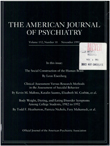Patients' attitudes toward hallucinations
Abstract
OBJECTIVE: This study examined patients' attitudes toward their hallucinations by assessing their beliefs about the purposes served by hallucinations and the adverse effects of hallucinations. It also investigated whether these attitudes were related to characteristics of the hallucinations or of the patients, whether the attitudes changed after treatment, and whether attitudes before treatment predicted the presence or absence of hallucinations after treatment. METHOD: Fifty hallucinating psychiatric inpatients were given semistructured interviews shortly after admission to the hospital and again shortly before discharge. The interviews elicited detailed descriptions of 12 phenomenologic characteristics of hallucinations and 11 attitude variables. RESULTS: The majority of subjects reported some positive effects of hallucinations. The presence of olfactory hallucinations and the ability to predict hallucinations were significantly related to valuing hallucinations. Attitudes usually did not change with treatment; when they did change they usually became more positive. Subjects who valued hallucinations more before treatment were significantly more likely to be hallucinating after treatment. CONCLUSIONS: The findings are consistent with the idea that psychological factors contribute to the expression of hallucinations. Assessing adaptive functions of hallucinations may predict whether hallucinations will respond to treatment and identify fruitful areas for psychosocial intervention.
Access content
To read the fulltext, please use one of the options below to sign in or purchase access.- Personal login
- Institutional Login
- Sign in via OpenAthens
- Register for access
-
Please login/register if you wish to pair your device and check access availability.
Not a subscriber?
PsychiatryOnline subscription options offer access to the DSM-5 library, books, journals, CME, and patient resources. This all-in-one virtual library provides psychiatrists and mental health professionals with key resources for diagnosis, treatment, research, and professional development.
Need more help? PsychiatryOnline Customer Service may be reached by emailing [email protected] or by calling 800-368-5777 (in the U.S.) or 703-907-7322 (outside the U.S.).



